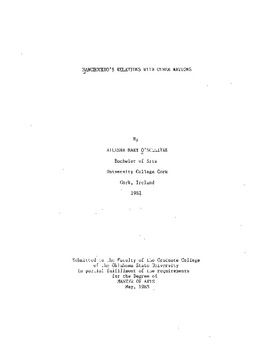| dc.contributor.advisor | Spaulding, Robert M. | |
| dc.contributor.author | O'Sullivan, Ailisha Mary | |
| dc.date.accessioned | 2015-09-08T18:12:54Z | |
| dc.date.available | 2015-09-08T18:12:54Z | |
| dc.date.issued | 1985-05-01 | |
| dc.identifier.uri | https://hdl.handle.net/11244/17404 | |
| dc.description.abstract | This study examines the puppet state of Manchoukuo, established by Japan in 1932, and its relations with other nations. The League of Nations decided in 1933 that Manchoukuo was not to be recognized either de facto or de jure by League members. This study examines both those countries which eventually recognized Manchoukuo, and those members of the League which held fast to the resolution of non-recognition, and discusses the various factors which influenced the policies of both groups. More than 50 years have passed since Manchoukuo was created, and almost 40 years since it expired. The Manchoukuoan government published the Chinese and Japanese texts of its formal legislation and other state papers in its daily official gazette, which has recently been republished on microfilm. The reasoning and planning behind these state papers usually remain undocumented because few internal records of the Manchoukuoan government survived the Second World War. However, the general patterns of decision-making is evident. The circumstances of the creation of Manchoukuo by Japan's Kwantung Army, though once secret, are now well documented. Official records show also that Japan controlled the Manchoukuoan government not only by Japanese military occupation of the country throughout its existence but more directly by appointing Japanese "deputies" to all senior and middle-level Manchoukuoan officials. These "deputies" had been officials of the Japanese civil service before being transferred to the Manchoukuoan civil service. They retained Japanese citizenship while in Manchoukuoan service, and after a few years they usually returned to positions in the Japanese government and were replaced in Manchoukuo by other.Japanese officials following the same career pattern. It cannot be doubted that these Japanese officials "on loan" to Manchoukuo either initiated or controlled every major action taken by the Manchoukuoan government. Consequently, references throughout this study to actions or statements by "the Manchoukuoan government" must be understood as referring to actions that were in essence Japanese. The ethnocentric term "Far East" and the inaccurate spelling "Manchukuo" have been retained in direct quotations. In all other places, the terms used are the value-free geographic term "East Asia" and the official and linguistically correct spelling "Manchoukuo". | |
| dc.format | application/pdf | |
| dc.language | en_US | |
| dc.publisher | Oklahoma State University | |
| dc.rights | Copyright is held by the author who has granted the Oklahoma State University Library the non-exclusive right to share this material in its institutional repository. Contact Digital Library Services at lib-dls@okstate.edu or 405-744-9161 for the permission policy on the use, reproduction or distribution of this material. | |
| dc.title | Manchoukuo's Relations with Other Nations | |
| dc.type | text | |
| dc.contributor.committeeMember | Sylvester, John A. | |
| dc.contributor.committeeMember | Jewsbury, George F. | |
| osu.filename | Thesis-1985-O85m.pdf | |
| osu.accesstype | Open Access | |
| dc.description.department | History | |
| dc.type.genre | Thesis | |
